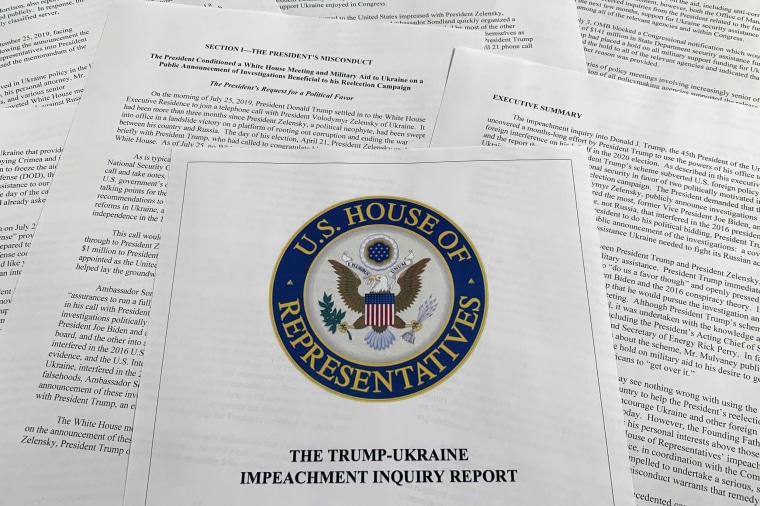In the movie “10 Things I Hate About You,” one ditzy character turns to another and asks: “I know you can be overwhelmed and you can be underwhelmed. But can you ever just be whelmed?” Her friend responds, “I think you can in Europe.”
That is now true in America as well. In fact, reading through the draft of the Trump-Ukraine impeachment inquiry report the U.S. House of Representatives Intelligence Committee released Tuesday afternoon is likely to leave one feeling distinctly whelmed. It tries to stir the blood with soaring rhetoric. But even if you agree on some points, the muddled document doesn’t amount to much, which is a shame.
Even if you agree on some points, the muddled document doesn’t amount to much, which is a shame.
Other readers may have different takeaways from this report, but my sense is that people who weren’t already predisposed to want President Donald Trump removed from office prematurely still won’t want him tossed after skimming this.
Take me: I am almost reflexively pro-impeachment. The presidency is too large and too powerful. The only way to hack it back down to something approaching its constitutional limits is to impeach and remove a president from office and thereby set an example for successors. And yet, as I was reading this report, I kept muttering things like, “Really? That’s the best you could do? Amateurs!”
Does this report show Trump being somewhat slimy and self-interested? Sure, but we already knew that when many of us voted to elect him president. (Full disclosure: I endorsed and voted for my apolitical father Bob Lott for president, as I have in all presidential elections since 2004. Most of the down-ticket votes I cast in 2016 were for Republicans.)
Does the House report demonstrate that Trump committed the “Treason, Bribery, or other high Crimes and Misdemeanors” that the Constitution specifies as grounds for impeachment and possible removal from office? Not unambiguously.
Critics charge that impeachment is a political act, which is true. Yet, it’s a political act with a legal character and to launch a successful process means making a legal case. But the lawyering in this report is atrocious.
For instance, this report sets out what is “typical” of U.S. presidents “for telephone calls with other heads of state” in congratulatory phone conversations in order to contrast them with Trump’s transgressions. (The call at issue took place in late July to congratulate Ukrainian President Volodymyr Zelenskiy on winning a majority in recent parliamentary elections.) But deviation from the conventions of this particular presidential duty seems a thin cause for impeaching a president, and the report does little to convince the public otherwise.
Did National Security Council staffers convene and take notes? Check. Did they give Trump a “standard package of talking points?” Check. Did those talking points include “recommendations to encourage President Zelenskiy to continue to promote anti-corruption reforms?” Check. However, the impeachment report warns ominously that after these preparatory steps took place, “this call would deviate significantly from that script.”
First, anyone who watched Trump on the stump or took in his inaugural address or ever followed him on Twitter has got to know that this is not a man we should ever expect to stick to a script. It just isn’t going to happen. If House Democrats are going to impeach Trump for that, they might as well add an article about the way he combs his hair.
Second, their incredibly uncharitable reading of the exchange seems a bit much. As it happens, I read the whole transcript of that call to refresh my memory after the report came out. Trump does not think of this conversation as particularly damning. When the controversy first started, he quickly moved to have it declassified and released so the American people could make up their own minds about the call.
After the initial pleasantries, the conversation started with Zelenskiy buttering Trump up for aid and access and saying specifically, “we wanted to drain the swamp here in our country.” One of the ways Trump suggests he do that is to look into a charge of cronyism and political leverage that, yes, involved possible future political opponent and former Vice President Joe Biden.
The report spins this into an elaborate theory about how Trump withheld money and access from Ukraine, based on what testimony Congress could muster, to benefit his 2020 re-election. The document doesn’t really have the goods because many of the people who could have shed the most light on the backroom machinations of the White House didn’t testify.
This report should not lead to Trump’s impeachment. It should lead to a resolution of censure by the full House, with a request that the Senate also join in.
Higher-ranking members of the executive branch did not do this because the Trump administration made a broad claim of executive privilege to shield them from testifying. The House Intelligence Committee should have litigated that claim in the courts to compel compliance, thus checking the president’s privilege and getting the necessary direct evidence. Instead, the committee simply decided to add this broad assertion of the right to use executive privilege as one more reason for impeachment.
It’s these sorts of soaring logical leaps that many senators will rightly laugh at if and when the president’s fate gets to them. That’s too bad, because Trump could use some real, persistent, level-headed oversight from Congress to keep him honest and dissuade him from self-dealing to his own enterprises while in office.
This report should not lead to Trump’s impeachment. It should lead to a resolution of censure by the full House, with a request that the Senate also join in. That, they just might do.


